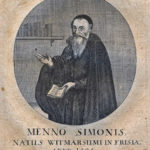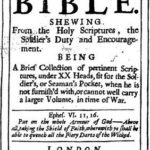We run our website the way we wished the whole internet worked: we provide high quality original content with no ads. We are funded solely by your direct support. Please consider supporting this project.

Jesus, the Center of Scripture
Paul declared that Jesus was nothing less than the very embodiment of all of God. This distinction of “all of God” is important for us to understand what it means for us to see Jesus and God rightly. Battling proto-gnostic teachers who were apparently presenting Christ alongside other manifestations of God, Paul declares “in Christ all the fullness of the Deity lives in bodily form” (Col. 2:9; cf. 1:19). His statement could hardly have been more emphatic:
“All” (pan)—not some
“of the fullness” (plērōma)—not a part or an aspect
“of the Deity” (theotēs)—not a lesser divine being.
As F.F. Bruce notes (regarding 1:19), Paul is asserting that, “all the attributes and activities of God—his spirit, word, wisdom and glory—are disclosed in [Christ].”[1] This staggering statement is teaching that all there is to know about God is found in Jesus, for all that makes God God was embodied in Jesus. And all that makes God known to us is found in Christ.
In addition to being the one revelation of God, he is also the one mediator between God and humans, as stated by Paul when he wrote “For there is one God and one mediator between God and mankind, the man Christ Jesus.” (1 Tim. 2:5). There is no other. The singularity of Christ’s role of mediating the life between humanity and God can only be understood as encompassing all of the revelation of God in Scripture.
Since Jesus is our one and only mediator, the mediating role that Scripture plays can’t be understood as taking place alongside of Jesus. It rather must be understood to mediate our knowledge of God as well as our salvation by participating in the mediation of Jesus.
More specifically, Scripture serves as an “intermediary mediator” by participating in the union of God and humanity in Christ. Hence, Scripture is the “secondary text” that mediates, and points us toward, the “real text,” which is the mediator Jesus Christ, in whom “all the fullness of God” dwells. Our view of Scripture as an “intermediary mediator” of God’s Word must therefore “reflect the fact … that Jesus in his person is the true Word and content of scripture…”[2]
A similar line of reasoning is employed by Graeme Goldsworthy when he argues that, if “Jesus is the one mediator between God and man,” then Jesus himself must be “the hermeneutic principle for every word from God.”[3] Insofar as Scripture mediates God’s revelation and salvation, in other words, it does so by pointing us to, and even participating in, the God-human as our one and only mediator.
This also applies to Christ’s mediatory role as the “head” of the cosmos, in which everything in heaven and earth will be reconciled to God and brought to a unity (Eph. 1:10; Col 1:19-20). This is speaking of Christ as the telos (the end goal) of all things, which implies that Jesus is the prime goal of all biblical texts. Since Christ is the one and only mediator, in other words, we can only see him as the mediator who is the ultimate subject matter of all mediating words of Scripture. And since Christ, as the cosmic mediator, is the ultimate telos and interpreter of all things, we must similarly consider Christ to be the ultimate telos and interpreter of Scripture.
All who interpret Scripture from a Christian perspective must assume that, ”…no text in either Testament exists without some connection to Christ.”[4] The key question that we must ask is how any text testifies to Jesus. Until an interpreter has disclosed how a text does this, they have not disclosed its ultimate meaning.
[1] F. F. Bruce, The Epistles to the Colossians, Philemon and to the Ephesians, NICNT (Grand Rapids: Eermans, 1984), 207.
[2] “The Atonement: The Singularty of Christ,” lix
[3] Gospel-Centered Hermeneutics, 252, cf. 62.
[4] Goldsworthy, Gospel-Centered Hermeneutics, 252.
Photo credit: Ben White via Unsplash
Category: General
Tags: Bible, Cruciform Theology, Jesus
Topics: Christology
Related Reading

One Hope
When Jesus was crucified by his enemies instead of conquering his enemies, the hope of Jesus’ disciples came crashing down in utter despair. They had hoped that Jesus would establish the kingdom of God in the same way that other kingdoms were established. However, the resurrection reveals that the kingdom of God is not like…

Sermon Clip: Keeping Christmas
Through Christ, God fulfills all his promises, and by yielding to him and giving up control, we can set ourselves free. Full Sermon here: http://whchurch.org/sermons-media/sermon/keeping-christmas

Early Anabaptists and the Centrality of Christ
In a previous post, I wrote about the Christocentric interpretation of the Scriptures espoused by the magisterial Reformers, specifically Luther and Calvin. Their hermeneutic was focused on the work and the offices of Christ, but in my opinion the Anabaptists surpasses their approach because it focused on the person of Christ with an unparalleled emphasis…

Does Jesus’ Abandonment on the Cross Destroy the Trinity?
In my previous blog I argued that Jesus’ experience of God-forsakenness on the cross was genuine and that, as a matter of fact, there was a genuine abandonment of Jesus by the Father on the cross. In fact, I am convinced that a good deal of our theology hangs in the balance on our affirming…

Podcast: Did Jesus Descend Into Hell?
Greg psychologizes Christ on the cross. http://traffic.libsyn.com/askgregboyd/Episode_0343.mp3

Jesus and Nationalistic Violence
Throughout the Old Testament, we find Israel spoken of as God’s “chosen nation.” The Israelites were to be a nation of priests whom God wanted to use to unite the world under him (Ex 19:6). Since nationalism and violence inevitably go hand in hand, as Jacque Ellul and others have noted, the covenant God made…
